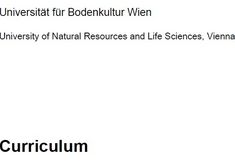Curriculum
How do I read a curriculum?
The respective curriculum is the legal basis for a degree course at university. It regulates the performance required to complete your academic studies and which academic title is awarded upon completion.
Where do I find the curriculum?
All of BOKU's curricula can be found in their full text version at courses offered.
How do I read a curriculum?
BOKU's curricula are arranged in tabular form. Every line represents a (normally one semester-long) course. The compulsory courses must all be completed. This means that the long table of compulsory courses reflects the contents of the degree program. You should not start to feel uneasy when looking through your compulsory courses.
Thy type of course is also stated and indicated the kind of course as well as whether or not additional tasks are required apart from the final exam or if there is compulsory attendance in the course. The weekly semester hours (SST) represent the number of hours held each week for the duration of one semester. Courses may also be blocked.
In order to receive a certificate at the end of the course, you have to complete the required proof of performance. This might, for example, be an exam, a seminar paper or a finished project. Depending on the complexity and effort involved in providing this proof of performance, ECTS (European Credit Transfer System) credit points are assigned. The aim of the degree course is to complete all required ECTS. ECTS represent the work load involved. 1 ECTS stands for about 25 working hours. In order to stick to the defined minimum study duration, you should complete 30 ECTS per semester which represents a workload of about 50 weekly working hours.
The so-called orientation phase ("Studieneingangs- und Orientierungsphase"), also referred to as STEOP, has been in effect for all bachelor's programs at BOKU since October 2011. These 2 STEP courses must be completed at the beginning of your academic studies. Only upon positive completion of these two courses are you entitled to participate in other exams from your curriculum. More information on this issue can be found here
What are compulsory courses, elective courses and free elective courses?
Compulsory courses are those courses that are required. Electives (and also compulsory courses for a specialization) may be chosen individually from a predefined pool and depending on your personal interests. Free elective courses facilitate to broaden your (professional) horizon: all courses that ECTS credit points are assigned for may be chose. These free elective courses can be completed at any accredited national or international university.
Is there compulsory attendance at university? There is normally no compulsory attendance for lectures (VO). Exercises (UE), seminars (SE) or projects (PJ) as well as the combination of lectures and exercises (VU) normally require attendance. Depending on whether or not attendance is compulsory, you MAY or MUST attend the courses. It is crucial that you know the course contents and pass the exam.
What else can be found in the curriculum? The curriculum regulates all issues related to your degree program at university. In some degree programs there is a so-called examination trail ("Prüfungskette"). This means that some courses may only be attended upon positive completion of other courses. Such examination trails must be stated in the respective curriculum. If internships are compulsory elements of the degree program, these also have to be stated in the curriculum.

